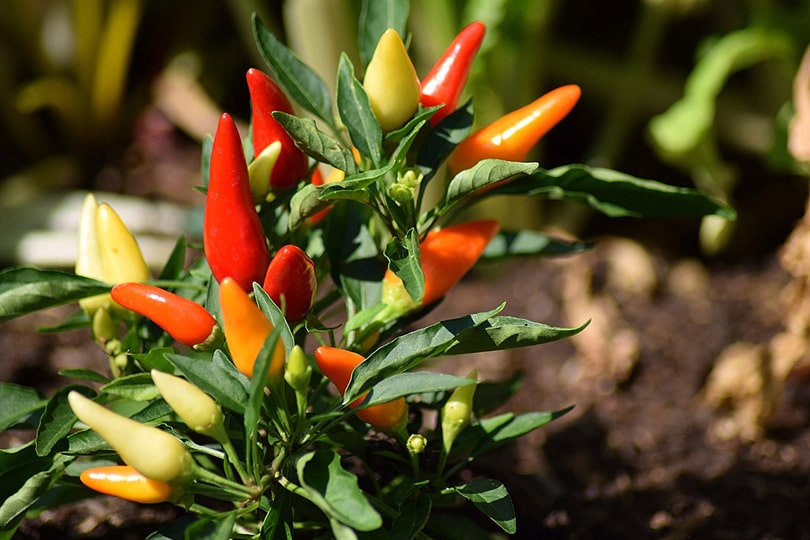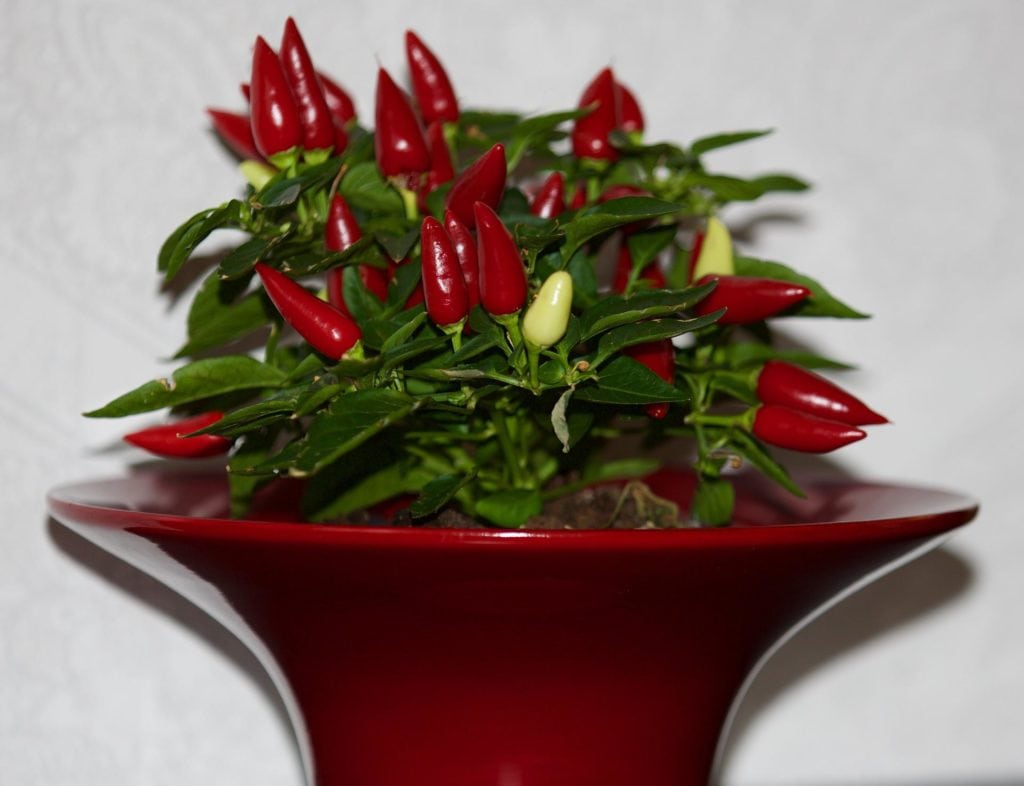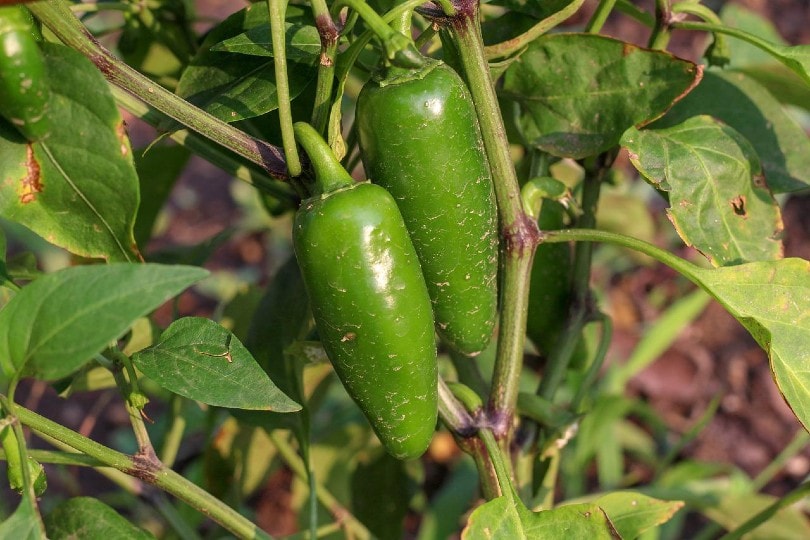How Much and How Often to Water Pepper Plants?
-
Kristin Hitchcock
- Last updated:

Usually, you should water pepper plants about once a week. However, this can vary widely depending on the temperature, humidity, wind, and other factors. Therefore, in hotter areas, you may need to water your plant much more often. Plants that are in smaller pots tend to get dry sooner, as there is less dirt to hold water.
The amount of water doesn’t matter all that much. You should water your pepper plant until the water is soaked and coming out of the drainage holes in the pot. If the pot is well-draining, you can’t overwater your plant unless you add gallons and gallons of water. Therefore, you should water your plant profusely and let the pot take care of draining the excess.
We recommend looking at the soil to determine when to water your plant. You want the top few inches to dry out completely to prevent fungal growth, which can quickly damage your plant’s roots. However, you don’t want to leave the soil this dry for too long, as it can starve your plant of the water it needs.
Therefore, we recommend checking the first few inches of soil with your finger once you notice that the top is dry. If it feels dry down a few inches, it is time to water your plant.
Can Pepper Plants Get Too Much Water?
Pepper plants can get too much water. Leaving too much water in the pot due to a lack of drainage can lead to root rot. Roots weren’t designed to stay underwater. Therefore, leaving them in a puddle can quickly damage the plant.
Furthermore, even if your plant has a pot with good drainage, letting too much water flow through the pot can remove nutrients from the soil. Eventually, the soil itself might be washed through the drainage holes.
Therefore, your best bet is to water your plant until the water begins to flow through the drainage holes. At this point, you can stop as the soil won’t hold any more water.

How Much Water Do Peppers Need Daily?
Unless your area is sweltering, you won’t need to water your plant daily. You should water your plant after the soil has dried a bit. On the longest, hottest days of summer, this may be in a single day. Plants exposed to lots of sunlight and high winds may dry even faster. You should also consider pot size and what is on the soil’s surface.
A plant in a smaller pot with nothing covering the soil will dry faster than one in a pot covered with mulch. One of these plants may need to be watered every day, while the other may only need to be watered every week.
On the cooler spring and fall days, plants will need less water. Assuming your plant is outside, the amount of rainfall will also dictate if you need to water your plant more or not. Sometimes, in wetter conditions, you may not need to water your plant at all.
Do Bell Pepper Plants Need a Lot of Water?
Bell pepper plants do need a decent amount of water. After all, producing large fruit requires a decent amount of water. Generally, your average bell pepper plant requires 2 inches of water per week. You can check to see how much water has fallen in your area to determine if your plant will need to be water.
Often, you do not need to water bell pepper plants daily. Instead, most of them do just fine with weekly watering. However, it does depend on the variety.
Some bell pepper plants require less water, while others require more. You should research your exact variety. However, these differences usually aren’t huge. Therefore, you can often plan on providing about 2 inches a week and adjusting depending on the weather in your area.

How Much Water to Pepper Plants Need per Week?
Peppers need a decent amount of water to make their fruits. However, the average pepper plant only needs about an inch per week, less than plants with larger veggies and fruits. Of course, you may need to increase this amount during very hot and dry periods, when water may evaporate from the soil faster.
You can check the rainfall amounts in your area each week to determine if you should water your plants. If you’ve gotten at least an inch, you likely won’t need to do any watering yourself. However, it does depend on other factors, such as how hot and humid it has been in your area.
Therefore, you’ll also need to keep an eye on your plants. In many cases, pepper plants will show you if they need more or less water.
Why Are My Pepper Plant Leaves Curling Up?
The best way to determine how much water your plant needs is to check the leaves. If there is an issue with the water amount your plant is receiving, the leaves will usually tell you.
If your pepper plant’s leaves are curling, it is usually a sign of overwatering. When the plant is overwatered, the roots may have difficulty extracting nutrients from the soil. Therefore, new leaves may not have the nutrients they need to thrive, leading to deformed growth and curls.
You should only water when the soil is dry. Don’t plan on watering your pepper plant daily, as this is far too much for most plants. Furthermore, you should also ensure that your pot has proper drainage.
Plant edema can also cause curling leaves. This cellular disorder makes it hard for the plant to retain water correctly, which leads to all sorts of issues. You will notice this in peppers as a white, crystallized texture under the leaves.
While this can’t be cured outright in all cases, we recommend increasing aeration. Usually, this can mean adding a fan or moving an indoor plant outside if possible. Consider spritzing the plant or moving it somewhere with increased humidity if the air is arid.
Nutritional deficiency can also cause leaves to curl so ensure you’re providing the necessary nutrients, especially calcium. Calcium, in particular, is utilized for cellular growth. A deficiency in it can lead to issues in plant development.
Too much light can sometimes cause your leaves to curl, too. However, in pepper plants, this factor usually only occurs when grow lights are misused. If you’re using grow lights, be sure that you have set them up correctly for your particular plant.
Conclusion
Pepper plants need a decent amount of water, just like most other vegetable plants. However, they don’t need as much as many. The average pepper plant only needs an inch of water a week, which will fall naturally in most areas. Therefore, outdoor plants usually don’t need to be watered unless it is scorching or during the longest days of summer.
If you have a potted plant, you may need to water your plant weekly. However, if your plant can access rainfall, then more water may not be necessary.
You should allow the top of the soil to dry completely before watering your plant. Use a finger to test soil wetness and water if it feels completely dry.
Featured Image Credit: HansLinde, Pixabay
Contents
